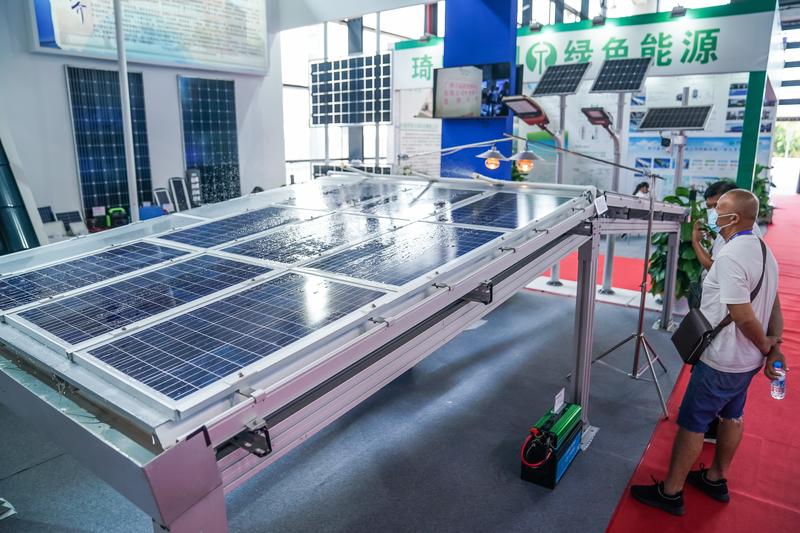'Broad cooperation space' highlighted by officials in promoting clean development
 Visitors check out rooftop photovoltaic panels during the China-ASEAN Expo in Nanning, Guangxi Zhuang autonomous region, in September 2021. (CHEN GUANYAN / CHINA NEWS SERVICE)
Visitors check out rooftop photovoltaic panels during the China-ASEAN Expo in Nanning, Guangxi Zhuang autonomous region, in September 2021. (CHEN GUANYAN / CHINA NEWS SERVICE)
China is willing to work with the Association of Southeast Asian Nations to promote green and low-carbon development, as part of the country's larger drive to make continuous contributions to global sustainable development, officials said on Thursday.
Su Wei, deputy secretary-general of the National Development and Reform Commission, highlighted the importance of promoting green, low-carbon and sustainable development, saying China and ASEAN member economies share a broad cooperation space.
We are willing to work with ASEAN to enhance cooperation on the development and application of energy technologies as well as green investment and financing.
Liu Qiong, Deputy Director, Department of Resource Conservation and Environmental Protection, NDRC
He said the two sides need to give full play to their complementary advantages in green and low-carbon development, enhance cooperation in fields such as green technologies, equipment and services, encourage enterprises to carry out green project cooperation and implement a batch of key green projects in terms of electricity, environmental protection, transportation and infrastructure construction.
More efforts should also be made to conduct regular international seminars on China-ASEAN low-carbon financing cooperation, strengthen the sharing of information and experiences in the field of green development and strengthen green finance cooperation between China and ASEAN member states.
Su made the remarks at the ASEAN-China International Workshop on Low Carbon Investments Cooperation held on Thursday. Taking place both online and offline, the workshop was co-organized by the NDRC's Belt and Road Initiative Center, ASEAN Centre for Energy and the Energy Foundation China.
After years of development, China has become the world's largest energy producer, building a diversified and clean energy supply and making considerable progress in its green transformation.
So far, China's installed capacity of renewable energy generation has surpassed 1.1 billion kilowatts, nearly four-fold more than a decade ago and accounting for over 30 percent of the world's total installed capacity of renewable energy. China's installed capacity for hydropower, wind, solar and biomass power generation has gained top spots worldwide.
Looking ahead, Liu Qiong, deputy director of the NDRC's Department of Resource Conservation and Environmental Protection, said China will ramp up efforts to continuously promote green and low-carbon energy transformation, with a key focus on supporting the clean and efficient use of coal, promoting the development of hydrogen and other renewable energies, promoting energy conservation and improving energy efficiency, embracing the green-tech revolution and actively participating in international energy cooperation.
Warning challenges from a cloudy global outlook and mounting uncertainties, Liu called for international cooperation in promoting green and low-carbon energy transformation on a global scale.
"ASEAN countries have rich energy resources, while China can offer technologies and equipment. We are willing to work with ASEAN to enhance cooperation on the development and application of energy technologies as well as green investment and financing," Liu said.
In response, Dadan Kusdiana, director-general of New Renewable Energy and Energy Conservation at the Ministry of Energy and Mineral Resources of Indonesia, said the country appreciates the progress of ASEAN-China energy cooperation and supports China's commitment to continue cooperation in the ASEAN regions through the facilitation of renewable energy development and the deployment of emerging low-carbon energy technologies.
He said ASEAN must develop proper and effective policy outcomes to embrace more low-carbon energy infrastructure programs.
He said Indonesia hopes that ASEAN-China cooperation will continually address financing and investment issues of clean energy technology in the region, and the collaboration of ASEAN and China could support the enhancement of energy security.
In 2020, ASEAN became China's largest trading partner for the first time, making the two sides each other's largest trading partners.
In the first 11 months, ASEAN's trade volume with China accounted for 15.4 percent of the country's total foreign trade.


